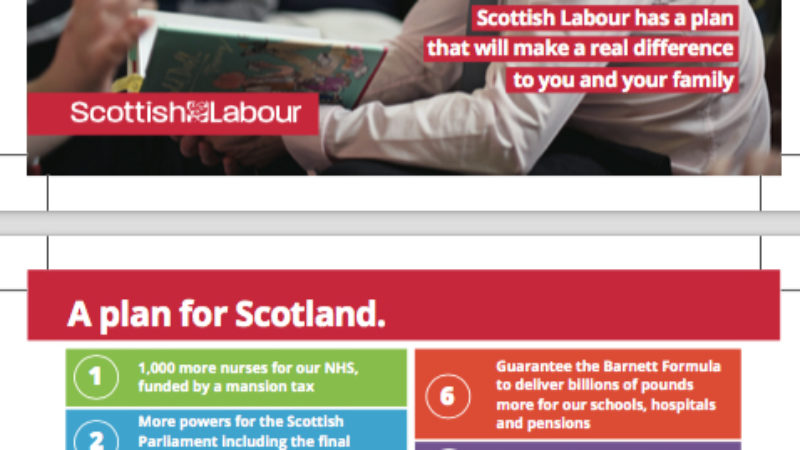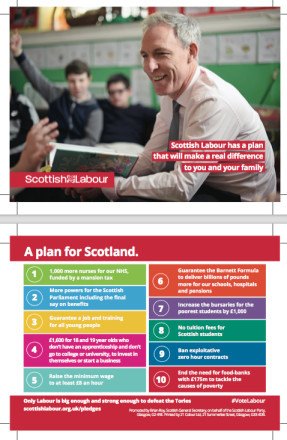
Jim Murphy will be launching Scottish labour’s election campaign today – and revealing the text of the party’s pledge card. This launch is likely to be overshadowed by the disputed claims that Nicola Sturgeon told French diplomats that the SNP would prefer a Tory government – but here’s the card, featuring Scottish labour’s 10 pledges:

And here are those pledges:
- 1,000 extra nurses for our NHS, funded by a mansion tax
- More powers for the Scottish Parliament including the final say on benefits
- Guarantee a job and training for all young people
- £1,600 for 18 and 19 year olds who don’t have an apprenticeship, go to college or university, to invest in themselves or start a business
- Raise the minimum wage to at least £8 an hour
- Guarantee the Barnett Formula to deliver billions of pounds more for our schools, hospitals and pensions
- Increase the bursaries for the poorest students by £1,000
- No tuition fees for Scottish students
- Ban exploitative zero hour contracts
- End the need for food-banks with £175m to tackle the causes of poverty
Meanwhile, Scottish Labour’s Deputy Leader Kezia Dugdale has followed in the footsteps of Douglas Alexander, producing a “state of the race” memo for Scottish Labour members – here it is:
“We’re now through the first week of this General Election campaign. I wanted to write to all of you to say thank you for the work you’ve been doing. As we all know, this is going to be one of the closest elections we’ve ever fought in Scotland, and it’s your hard graft that will help us win.
This is one of the biggest campaigns that the Scottish Labour Party has ever run. Last week, we knocked on 150,000 doors. And tens of thousands more people received a leaflet or a letter from us that you delivered. Already, we’ve been in touch in person or in writing with every one of the 190,381 people that Jim committed to contacting when he became leader in December.
I know from being out campaigning with you this week that these conversations are helping us win people over, and that only Labour can deliver the change our country needs. There are more undecided voters now than there ever has been, and we need to speak to them all numerous times before polling day.
We’ve also had one of our most successful weeks online, with our election broadcast starring David Tennant and Martin Freeman clocking up tens of thousands of views on Facebook and YouTube. And 100,000 people saw a piece of our content on Facebook during the debate.
This week has again focused the minds of people across Scotland on the choice that they have to make at this election. At the TV debate on Thursday night, we saw Ed Miliband take on David Cameron. It’s the only time both of them will be on the same stage at the same time during the campaign.
And what we saw was David Cameron the invisible man – unable and unwilling to defend his record. He wasn’t able to defend the growing number of zero hours contracts, the pain inflicted by the bedroom tax, or why so many people have to try to get by in low pay, insecure jobs. That tells you everything you need to know about this Tory Prime Minister, and why we need change on 7th May.
It’s no surprise that Ed was top of three of the four polls on Thursday night. That means he’s been on top after both of the televised events over the past two weeks.
And we know why that has happened. Ed is the only person who can provide a serious alternative to David Cameron. And in the debates he made absolutely clear that working people the length and breadth of the country are our priority.
He told people exactly how he would end exploitative zero hours contracts, raise the minimum wage and freeze energy prices for working families. Against that, the Tories have run away from defending their record and this week they have simply resorted to desperate personal attacks on Ed instead.
Kezia”




More from LabourList
‘Labour’s quiet quest for democratic renewal’
‘Labour promised to make work pay. Now it must deliver for young people’
‘Council Tax shouldn’t punish those who have the least or those we owe the most’